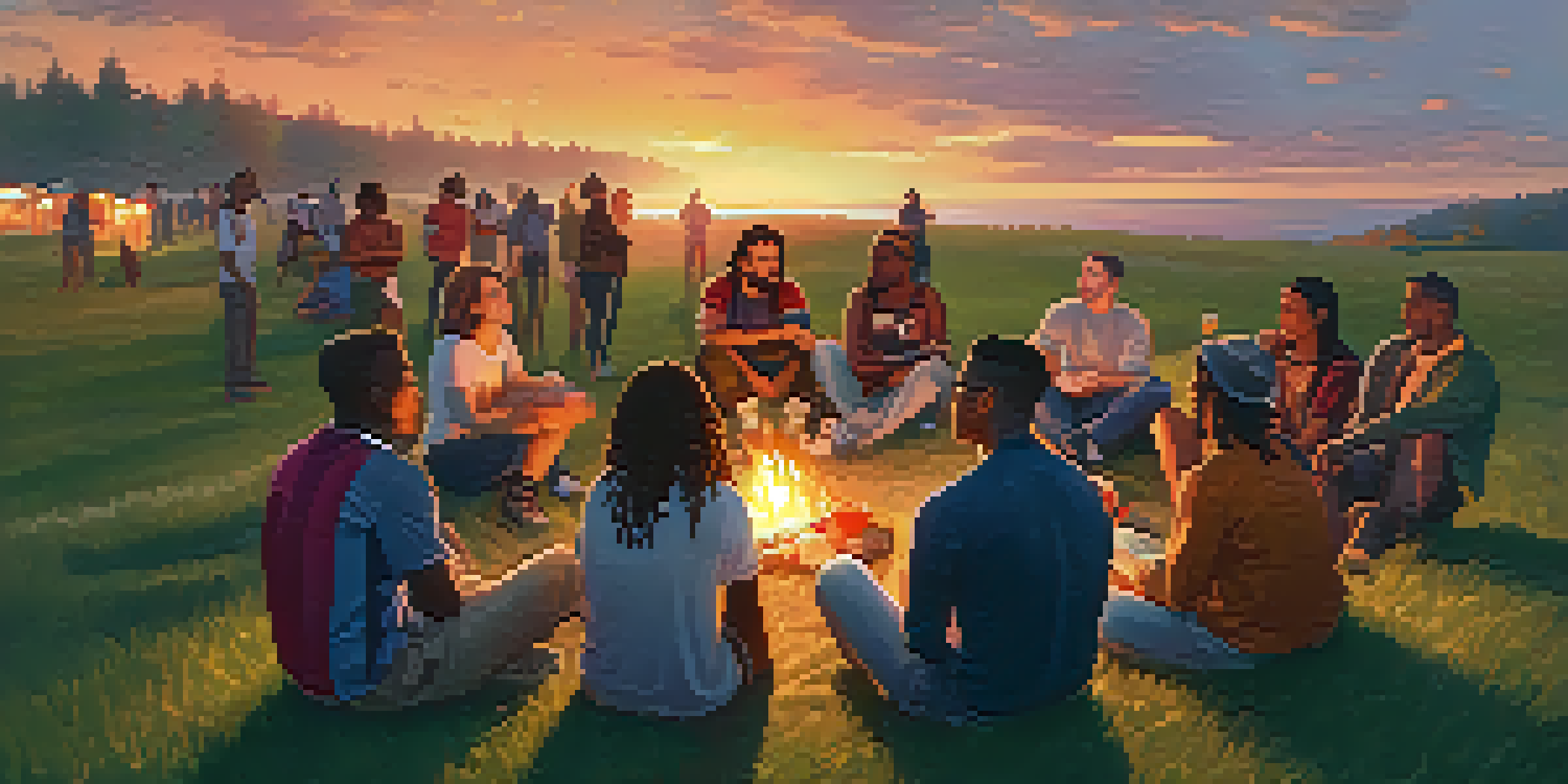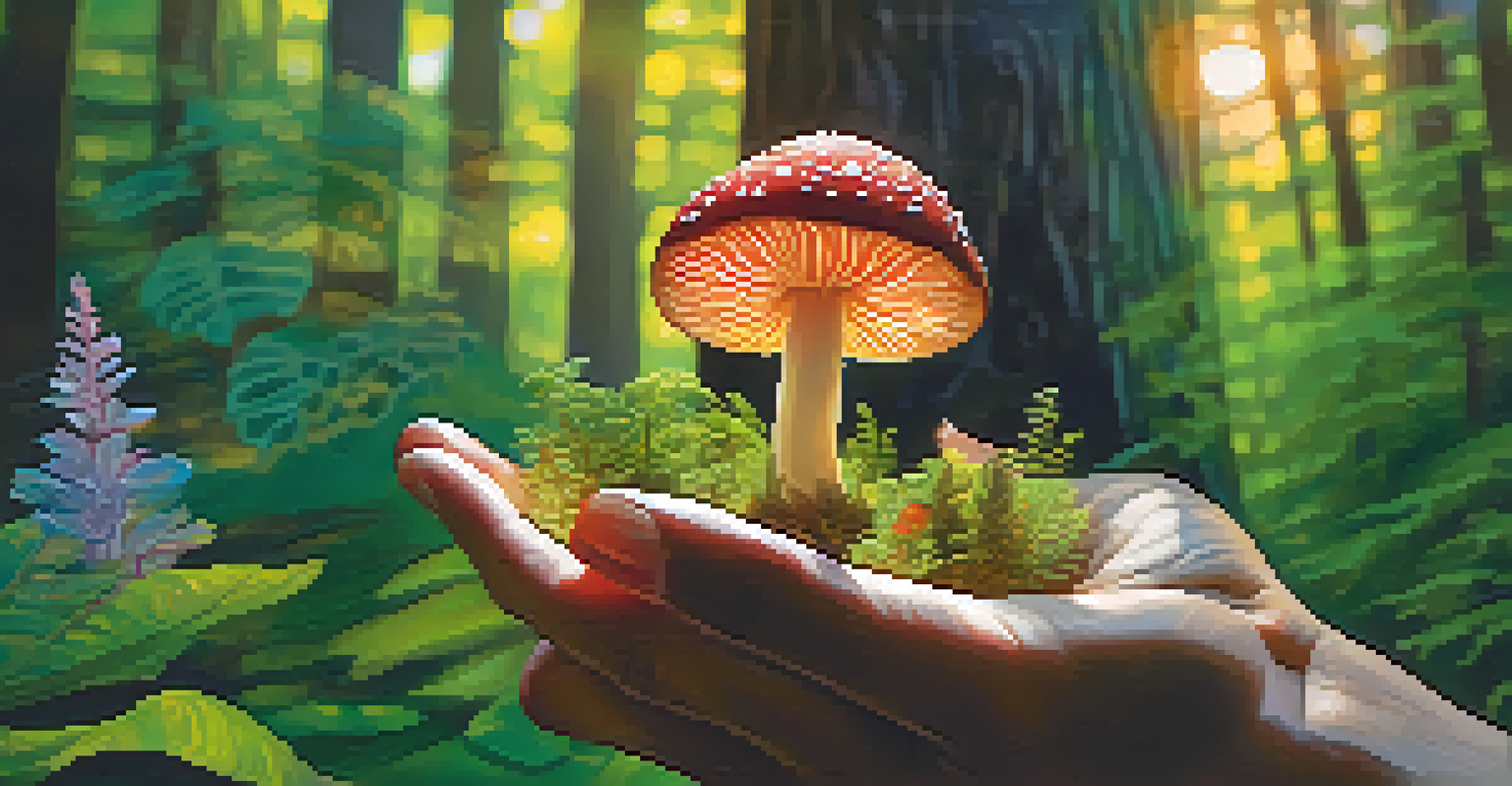The Intersection of Psychedelics and LGBTQ+ Rights

Understanding Psychedelics and Their Impact
Psychedelics, substances that alter perception and consciousness, have gained significant attention in recent years. These compounds, such as psilocybin and LSD, are not only being studied for their therapeutic potential but also for their cultural significance. Many within the LGBTQ+ community have turned to psychedelics for personal exploration and healing, seeking to navigate the complexities of their identities.
Psychedelics can help us to confront deep-seated emotions and experiences that we often avoid.
The interest in psychedelics among LGBTQ+ individuals can be linked to a history of marginalization and trauma. Many face societal pressures, discrimination, and mental health challenges, prompting an exploration of alternative healing methods. Psychedelics offer a unique lens for self-discovery, allowing individuals to confront deep-seated emotions and experiences.
Moreover, the growing body of research highlighting the mental health benefits of psychedelics has sparked discussions on their role in LGBTQ+ wellness. As the stigma surrounding these substances begins to fade, a new conversation emerges about how they can serve as catalysts for acceptance and understanding.
The Historical Context of Psychedelics and LGBTQ+ Culture
The relationship between psychedelics and the LGBTQ+ community is deeply rooted in history. During the 1960s and 1970s, many LGBTQ+ activists embraced psychedelic experiences as part of their journey toward self-acceptance and liberation. This era of counterculture encouraged exploration of identity, spirituality, and community, often through the use of psychedelics.

As the LGBTQ+ rights movement progressed, psychedelics became a symbol of rebellion against societal norms. They represented a break from traditional values, encouraging individuals to embrace their true selves. Many early LGBTQ+ gatherings involved discussions around psychedelics, emphasizing their role as tools for personal and collective empowerment.
Psychedelics Aid LGBTQ+ Healing
Many LGBTQ+ individuals are turning to psychedelics for personal exploration and healing from trauma.
However, the subsequent criminalization of psychedelics in the late 20th century led to a decline in their acceptance. Despite this, the legacy of their use within the LGBTQ+ community persisted, influencing contemporary discussions about mental health and identity.
Psychedelics as Tools for Healing Trauma
Trauma is a common experience among many LGBTQ+ individuals, often stemming from discrimination, rejection, and violence. Psychedelics are emerging as promising tools for healing these traumas, offering new perspectives on painful experiences. Research indicates that substances like MDMA and psilocybin can help individuals process trauma more effectively, leading to breakthroughs in therapy.
The therapeutic potential of psychedelics offers a new path for healing trauma, especially for marginalized communities.
For many, the psychedelic experience can create a sense of safety and openness, making it easier to confront difficult emotions. This can be particularly beneficial for those who have struggled with their identities or faced societal rejection. As a result, more LGBTQ+ individuals are turning to psychedelics as part of their healing journey.
Additionally, the communal aspect of psychedelic experiences fosters connection and understanding, which is vital for LGBTQ+ healing. Sharing these experiences within supportive groups can create a powerful sense of belonging, reinforcing the idea that no one is alone in their struggles.
The Role of Community and Support Networks
Community plays a crucial role in the intersection of psychedelics and LGBTQ+ rights. Support networks, whether formal or informal, provide spaces for individuals to share their experiences and insights. These communities often emphasize safe practices and harm reduction, ensuring that members can explore psychedelics responsibly.
For LGBTQ+ individuals, finding a supportive community can be transformative. Many seek out spaces where they can engage in discussions about identity, mental health, and the therapeutic potential of psychedelics. This sense of belonging can enhance the positive effects of the psychedelic experience, fostering deeper connections.
Community Supports Psychedelic Use
Support networks within the LGBTQ+ community provide safe spaces for sharing experiences and promoting responsible psychedelic use.
Furthermore, these communities can act as advocacy groups, pushing for policy changes that promote the safe use of psychedelics. By raising awareness and reducing stigma, they contribute to a broader understanding of how psychedelics can benefit marginalized populations.
Challenges and Stigmas Surrounding Psychedelic Use
Despite the growing interest in psychedelics, significant challenges and stigmas remain. Many LGBTQ+ individuals still face societal pressures that discourage open discussions about drug use, even in therapeutic contexts. This stigma can hinder access to valuable resources and support, limiting the potential benefits of psychedelics.
Additionally, the legal status of many psychedelics complicates their use, creating barriers for those seeking therapeutic experiences. While some regions are beginning to relax laws around these substances, many LGBTQ+ individuals still navigate a complex legal landscape. This can lead to fear of legal repercussions, further isolating those in need of healing.
Overcoming these challenges requires ongoing education and advocacy. By sharing stories and research, the LGBTQ+ community can help shift perceptions, paving the way for a more accepting approach to psychedelics as tools for healing and empowerment.
Research and Future Directions in Psychedelic Therapy
As research into psychedelics continues to expand, the potential for therapeutic applications grows. Many studies are focusing on how these substances can specifically benefit LGBTQ+ individuals, addressing issues like anxiety, depression, and PTSD. This scientific exploration promises to deepen our understanding of the intersection between psychedelics and LGBTQ+ rights.
Emerging research highlights the need for inclusivity in clinical trials, ensuring that LGBTQ+ individuals are represented. By involving diverse populations, researchers can gain insights into how different identities and experiences interact with psychedelic therapies. This inclusivity is essential for developing effective treatment protocols that resonate with various communities.
Stigmas Hinder Access to Psychedelics
Despite growing interest, societal stigma and legal barriers still limit access to the therapeutic benefits of psychedelics for LGBTQ+ individuals.
Looking ahead, the future of psychedelic therapy holds great promise for LGBTQ+ rights advocacy. As more evidence supports the efficacy of these substances, they may become integral to mental health initiatives, promoting acceptance and healing within marginalized communities.
The Path Forward: Embracing Psychedelics and Advocacy
Embracing psychedelics as a legitimate tool for healing requires a collective effort from both the LGBTQ+ community and allies. Advocacy plays a crucial role in changing perceptions and policies surrounding psychedelic use. By working together, individuals can help dismantle the stigma and support initiatives that promote safe access to these substances.
Moreover, education is key. Workshops, seminars, and community events can foster understanding and acceptance, empowering individuals to explore psychedelics responsibly. These initiatives can also create spaces for dialogue about the unique challenges faced by LGBTQ+ individuals in accessing mental health resources.

Ultimately, the intersection of psychedelics and LGBTQ+ rights represents an opportunity for growth and healing. By advocating for change, supporting research, and fostering community connections, we can create a brighter future that embraces the transformative potential of psychedelics for all.